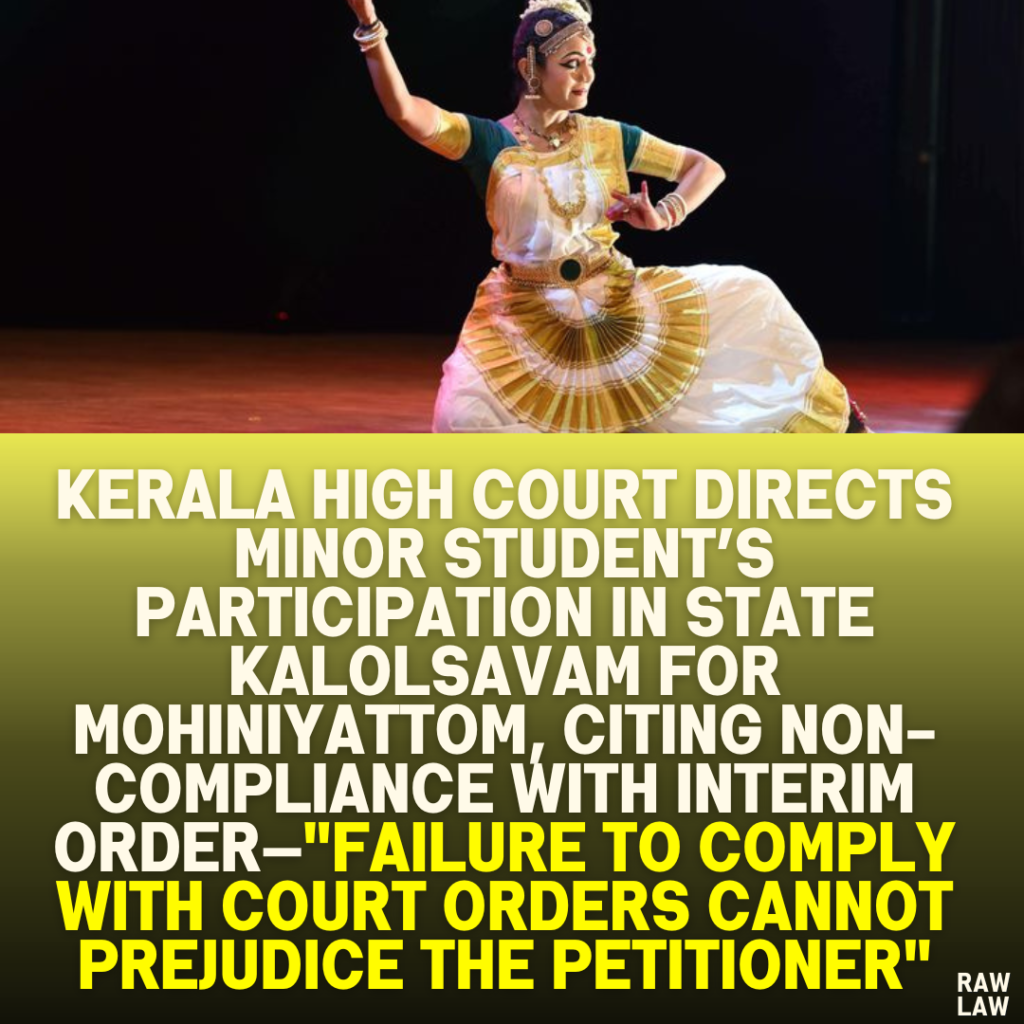Court’s Decision
The High Court of Kerala, presided over by Justice C. Jayachandran, directed that the petitioner, a minor student, be allowed to participate in the State Kalolsavam event for Mohiniyattom at the Higher Secondary level. This direction was issued after observing that the authorities had failed to comply with the court’s prior interim order to resolve the petitioner’s appeal within a specified timeframe. The court explicitly stated that the benefit of such inaction should favor the petitioner.
Facts
- The petitioner, a 17-year-old minor, represented by her father, had participated in the Mohiniyattom event at the district level and secured third place. Dissatisfied with the results, she filed an appeal before the Appeal Committee of the Ernakulam District School Kalolsavam.
- Due to a lack of timely resolution of her appeal, the petitioner approached the High Court. On December 24, 2024, the court directed the Appeal Committee to consider her appeal within three days and make a decision.
- Evidence was presented to the court that the order had been duly served on the Office of the Deputy Director of Education on December 27, 2024. However, as of January 3, 2025, the appeal had not been addressed by the authorities, prompting the petitioner to file the current writ petition.
Issues
- Did the authorities fail to comply with the interim order issued by the High Court?
- Should the petitioner be granted relief by allowing her to participate in the State Kalolsavam due to the authorities’ inaction?
Petitioner’s Arguments
- The petitioner argued that despite the court’s clear directions in the interim order, the authorities failed to take action on her appeal.
- It was further contended that evidence (such as delivery confirmation) showed the order had been served on the relevant office, but the respondents neglected to comply within the stipulated timeframe.
- Due to the authorities’ failure, the petitioner’s opportunity to participate in the State Kalolsavam was unjustly jeopardized.
Respondent’s Arguments
- The learned Government Pleader submitted that the Appeal Committee was unaware of the court’s interim order and, therefore, could not act upon it.
- It was argued that the lack of communication to the Appeal Committee was unintentional and not a deliberate act of defiance.
Analysis of the Law
- Importance of Compliance with Judicial Orders:
- The court underscored that compliance with judicial orders is not optional and is binding on all parties, particularly public authorities.
- The court found the explanation provided by the Government Pleader unsatisfactory, given the evidence that the order was served well before the deadline.
- Judicial Oversight:
- The High Court stressed that failure to comply with judicial directives undermines the rule of law and deprives individuals of their rightful remedies.
- Remedial Measures:
- As the petitioner had suffered due to the authorities’ inaction, the court deemed it necessary to provide relief by allowing her participation in the Mohiniyattom event.
Precedent Analysis
While no specific case law was cited in the judgment, the court relied on general principles of administrative law:
- Non-compliance with judicial orders amounts to a dereliction of duty and warrants intervention by the judiciary.
- The principles of natural justice require that the petitioner should not suffer due to the inaction of authorities.
Court’s Reasoning
- The court dismissed the respondents’ claim that the Appeal Committee was unaware of the order, as evidence showed that the order had been served to the Deputy Director’s office on December 27, 2024.
- It was observed that the delay in action was entirely attributable to the respondents and that this failure could not prejudice the petitioner.
- The court remarked: “The contention of the learned Government Pleader cannot be countenanced for a moment.”
- The judge further stated that the petitioner’s participation in the event was a matter of justice, and the authorities’ inaction could not deprive her of the opportunity.
Conclusion
The court allowed the writ petition and directed the petitioner to be permitted to participate in the Mohiniyattom event at the State Kalolsavam at the Higher Secondary level. The court reiterated that the failure of the respondents to comply with its order justified granting the petitioner the relief sought.
Implications
- Strengthening Judicial Authority:
- The judgment reinforces the principle that court orders are binding and must be complied with promptly by public authorities.
- Non-compliance with court directives may result in adverse consequences for the defaulting party.
- Protecting Rights of Minors:
- The decision underscores the judiciary’s commitment to protecting the rights and interests of minors, especially in cases where administrative negligence impacts their legitimate aspirations.
- Accountability of Public Authorities:
- This judgment serves as a reminder to public authorities of their duty to act promptly on judicial orders and the consequences of failing to do so.




Pingback: Delhi High Court: "Judicial Activism Cannot Override Mandatory Legal Requirements"; Dismisses Probate Appeal for Will Lacking Two Attesting Witnesses - Raw Law